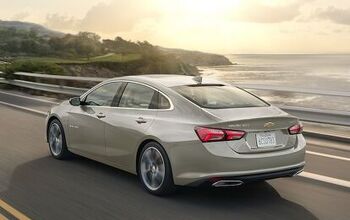Trade War Watch 17: China Slams GM And Chrysler For Illegal Dumping, Subsidies
The trade war that erupted between the US and China late last summer may have cooled to an angry simmer, but its effects are once again being noticed in the automotive industry. After President Obama slapped a 35% tariff on imports of Chinese-produced tires, the Chinese government started casting around for potential objects of retaliation, and, as Bertel reported, US auto exports to China made “a good tit-for-tat.” The US imported $1.8b worth of Chinese tires in 2009, while China imported $1.1b worth of US-built cars (including transplant brands) in 2008. You shoot our dog, we’ll kill your cat.”
Now, the Chinese Ministry of Commerce has concluded its “investigation” into US auto dumping and illegal subsidies in the Chinese market, and it just so happens to single out the two automakers who are partially owned by the US. Coincidence? Not so much. [Hat Tip: Michael Banovsky]
Chinaautoweb reports the Chinese Commerce Ministry’s findings of dumping and subsidies for US-built “saloon cars and cross-country cars (of a cylinder capacity >2500cc)” as follows:
Dumping margins of US-built vehicles, by manufacturer:
1. General Motors LLC, 9.9%
2. Chrysler Group LLC, 8.8%
3. Mercedes-Benz U.S. International, Inc.2.7%
4. BMW Manufacturing LLC, 2.0%
5. American Honda Motor Co, Inc. 4.4%
6. All Others, 21.5%
Ad valorem subsidy rates, by manufacturer:
1. General Motors LLC, 12.9%
2. Chrysler Group LLC, 6.2%
3. Mercedes-Benz U.S. International, Inc., 0%
4. BMW Manufacturing LLC, 0%
5. American Honda Motor Co, Inc. 0%
6. All Others 12.9%
The good news? At this point, the Chinese government has no immediate plans to introduce new duties on vehicle imports from the US. For now, the Commerce Ministry is collecting comments and evidence, and will make a policy recommendation based on review of that new evidence. Meanwhile, it’s still not clear how the Ministry determined these subsidy or dumping rates, so we’ll continue to examine their determination and seek out insight into its creation and consequences.
Ultimately though, Chinese imports of large-capacity US-built cars are small enough that this tussle will seriously affect neither the Chinese market nor GM and Chrysler. Of greater interest: the extent to which these two firms were targeted due to their US government ownership stakes. After all, if you’re going to retaliate in a trade war, why not attack the firms closest to the opposing government’s heart?
More by Edward Niedermeyer
Latest Car Reviews
Read moreLatest Product Reviews
Read moreRecent Comments
- Tassos Under incompetent, affirmative action hire Mary Barra, GM has been shooting itself in the foot on a daily basis.Whether the Malibu cancellation has been one of these shootings is NOT obvious at all.GM should be run as a PROFITABLE BUSINESS and NOT as an outfit that satisfies everybody and his mother in law's pet preferences.IF the Malibu was UNPROFITABLE, it SHOULD be canceled.More generally, if its SEGMENT is Unprofitable, and HALF the makers cancel their midsize sedans, not only will it lead to the SURVIVAL OF THE FITTEST ones, but the survivors will obviously be more profitable if the LOSERS were kept being produced and the SMALL PIE of midsize sedans would yield slim pickings for every participant.SO NO, I APPROVE of the demise of the unprofitable Malibu, and hope Nissan does the same to the Altima, Hyundai with the SOnata, Mazda with the Mazda 6, and as many others as it takes to make the REMAINING players, like the Excellent, sporty Accord and the Bulletproof Reliable, cheap to maintain CAMRY, more profitable and affordable.
- GregLocock Car companies can only really sell cars that people who are new car buyers will pay a profitable price for. As it turns out fewer and fewer new car buyers want sedans. Large sedans can be nice to drive, certainly, but the number of new car buyers (the only ones that matter in this discussion) are prepared to sacrifice steering and handling for more obvious things like passenger and cargo space, or even some attempt at off roading. We know US new car buyers don't really care about handling because they fell for FWD in large cars.
- Slavuta Why is everybody sweating? Like sedans? - go buy one. Better - 2. Let CRV/RAV rust on the dealer lot. I have 3 sedans on the driveway. My neighbor - 2. Neighbors on each of our other side - 8 SUVs.
- Theflyersfan With sedans, especially, I wonder how many of those sales are to rental fleets. With the exception of the Civic and Accord, there are still rows of sedans mixed in with the RAV4s at every airport rental lot. I doubt the breakdown in sales is publicly published, so who knows... GM isn't out of the sedan business - Cadillac exists and I can't believe I'm typing this but they are actually decent - and I think they are making a huge mistake, especially if there's an extended oil price hike (cough...Iran...cough) and people want smaller and hybrids. But if one is only tied to the quarterly shareholder reports and not trends and the big picture, bad decisions like this get made.
- Wjtinfwb Not proud of what Stellantis is rolling out?

































Comments
Join the conversation
Technically, GM & Chrysler were subsidized, and by definition you could make the argument they were dumping. WTO legal definitions of government subsidies having been further refined recently with the Boeing subsidies by the US government to be also considered illegal. The question becomes, "so what are you going to do about it?". China? EU? Indeed, I've always assumed that other countries would use the US automotive bailouts as an excuse at some point in the future for their own subsides or tariffs. Now, who's the US to complain if China, or anyone else, subsidizes their own auto industry without sounding hypocritical. This here is the sound of China loading its ammunition.
Obama should have just made the tires illegal to import, because they really are that bad.